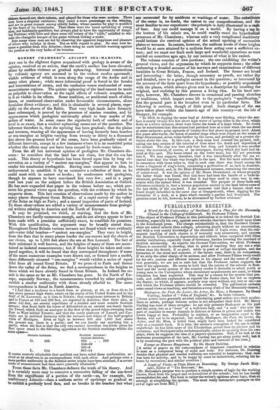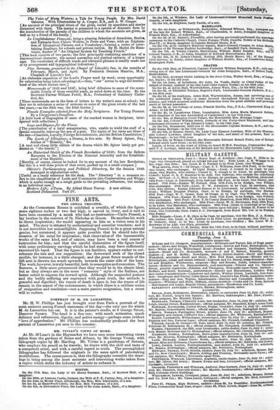PUBLICATIONS RECEIVED.
A Word for the Universities of Scotland; and a Plea for the Humanity Classes in the CollegeofEdinburgh. By Professor Pilk118. IThe object of Professor Pillans in this publication is to defend the Scottish Uni- versities, especially his own, against some attacks that have been made upon them in the Edinburgh press. The charge substantially is, that the Northern Univer- sities are rather schools than colleges, admitting pupils without an examination, and with a very scanty knowledge of the elements of Latin even; that the sub- sequent teaching of such classes is of necessity very elementary, and exposes the Scottish Universities to depreciation and ridicule when compared with other similar institutions, especially those of Germany, besides lowering the standard of Scottish scholarship. As regards the German Universities, we think Professor Pillans is successful in showing, that in point of teaching they are not a whit, better than the Scotch, if so good; while in point of college discipline, and the formation of the mind and manners of the future man, there is no comparison. if we strip the other charge of its animus, and allow Professor Pillans every credit for his own zealous and efficient labours in his classes and the cause of educa- tion generally, we are not so sure but that the Professor rather supports the case of his opponents. He seems to hold that the nature of the schools in Scot- land and the social system of the country render it desirable to admit youth or young men to the Universities whose elementary acquirements are scant, or whose education has been neglected. This may be a reason for the system that pre- vails, and sufficient explanation as regards the Junior class, but not as respects the Senior; to which, it appears, anybody may enter without any test at all,—an evil which the Professor admits should be remedied. The publication contains some sound views on teaching, and furnishes a coup d'ceil of the Humanity classes.]
Shakspere, the Poet, the Lover, the Actor, the Man; a Romance. By Henry Curling, Author of "John of England," &c. In three volumes.
[Great artists have generally avoided introducing great artists into their produc- tions as actors, perhaps because action is not altogether their field. Mr. Henry Curling has none of these scruples: he not only presents Shakspere as the poet and the actor, but as a "lover" of a well-born lady, and "a man" who acts the part of machine to rescue damsels in distress or heroes in prison and makes two lovers happy at last. Probability in conduct, or an imagination equal to the theme, was not to be expected; but really, Shakspere, the Poet, the Lover, the Actor, and the Man, is better than might have been looked for considered only as a readable book. It is true, the author's conception of the age is rather superficial: he has little more of the-Elizabethan period than its phrases and its costumes; and Shakspere talks melodramatically, unless in speaking from his own plays, when he suggests the idea of a players quotations. Still, if we look at the enormous presumption of the task, Mr. Curling has got along pretty well; but it is by connecting the poet with the political plots and turmoils of the time.]
Essays on Human Happiness. Br Dr. Henry Duhring.
[A series of papers on the commonplaces of happiness considered in relation to man as a compound being of mind and body. For instance, Dr. Duhring decides that physical and mental wellbeing are essential to happiness; that man was born for activity, and to be happy he must be industrious, relieving his la- bours by recreation; and similar novelties.]
A Logic of Facts; or Plain Hints on Reasoning. By George Jacob Holy- oake, Editor of "The Reasoner," Sce.
[Mr. Holyoake's purpose was to produces simple system of logic for the working classes, freed from the jargon and technicalities of the schools: but he has hardly accomplished his end. 'fhe book is rather the writer's opinions about logic, than an attempt at simplifying the system. The most really instructive passages on the art of logic are from Mill.] The Voice of Many Waters; a Tale for Young People By Mrs. David Osborne. With Illustrations by A. Cooper, KA., and A. W. Cooper. [An account of the principal rivers of the globe, varied by anecdotes and stories connected with them. The matter is presented in a species of dramatic form by the introduction of the parents of the children to whom the accounts are given, as well as by a friend of the family.] Le Confabuktteur Francais; being a pleasing Selection of Anecdotes, Stories,
and Extracts from Classic Writers, in Prose and Verse, with an Explana-
tion of Idiomatical Phrases, and a Vocabulary; forming a series of enter-
taining Readings, for schools and private tuition. By M. Mariot De Beau-
voisin, Author of "An Original System for Teaching French.' [This book consists of two parts; the first principally containing anecdotes of a conversational character, the second narratives and poetical extracts of a longer cast. The vocabulary of difficult words and idiomatic phrases is readily made use of by arrangement and typographical indications.] Nine Sermons, preached in the Chapel of Lincoln's Inn, in the months of February, March, and April. By Frederick Denison Maurice, M.A., Chaplain of Lincoln's Inn.
[An elaborate exposition of the Lord's Prayer word by word; every opportunity for exhortation being taken advantage of,-thns, " our " serves to urge the brother- hood of the whole human race.]
Memoranda of 1846 and 1847; being brief Allusions to some of the mem- orable Events of those eventful years, as noted down at the time. By the Reverend Fnlwar William Fowle, M.A., Prebendary of Salisbury Cathe- dral, &c.
[These memoranda are in the form of letters to the writer's sons at school; but they are in substance a series of sermons on some of the great events of the last two years,-as the Sikh war, the Irish famine.] Female Examples selected from the Holy Scriptures. For Young Persons. By a Clergyman's Daughter.
[A little book of biographies of some of the marked women in Scripture, inter- spersed with reflections.] Lays and Rhymes for the Times.
[The contribution of a loyal sexagenarian' who, unable to wield the staff of a special constable, takes up the pen of a poet. The topics of his verse are those of the day-Chartism, Loyalty, Foreign Revolutionists, and the British Constitution.] The Lords of Ellingham • a Drama, in five acts. By Henry Spicer, Esq., Author of "Honesty," Ace.
[A neat and cheap little edition of the drama which Mr. Spicer lately got pre- sented on "the boards."]
An Historical Sketch of the French Revolution of 1848; from the Reform Banquets to the Election of the National Assembly and the Establish- ment of the Republic. [Novelty, of course, cannot be looked for in any account of the late Revolution; but this is a well done precis of that event, packed up in a small compass.] 011ivier's Parliamentary and Political Directory, for the Session 1848. Arranged in alphabetical order. [Useful as a ready reference for the desk. The " Directory" in a measure re- fers to the classification of Lords and Commoners into Conservatives and Whigs; which is useful enough as a rough guide to the prevailing influences, but useless in an individual case.] Modern Lifei a Poem. By Alfred Dixon Toovey. A new edition. Scotland Delineated. Part IV.



























 Previous page
Previous page